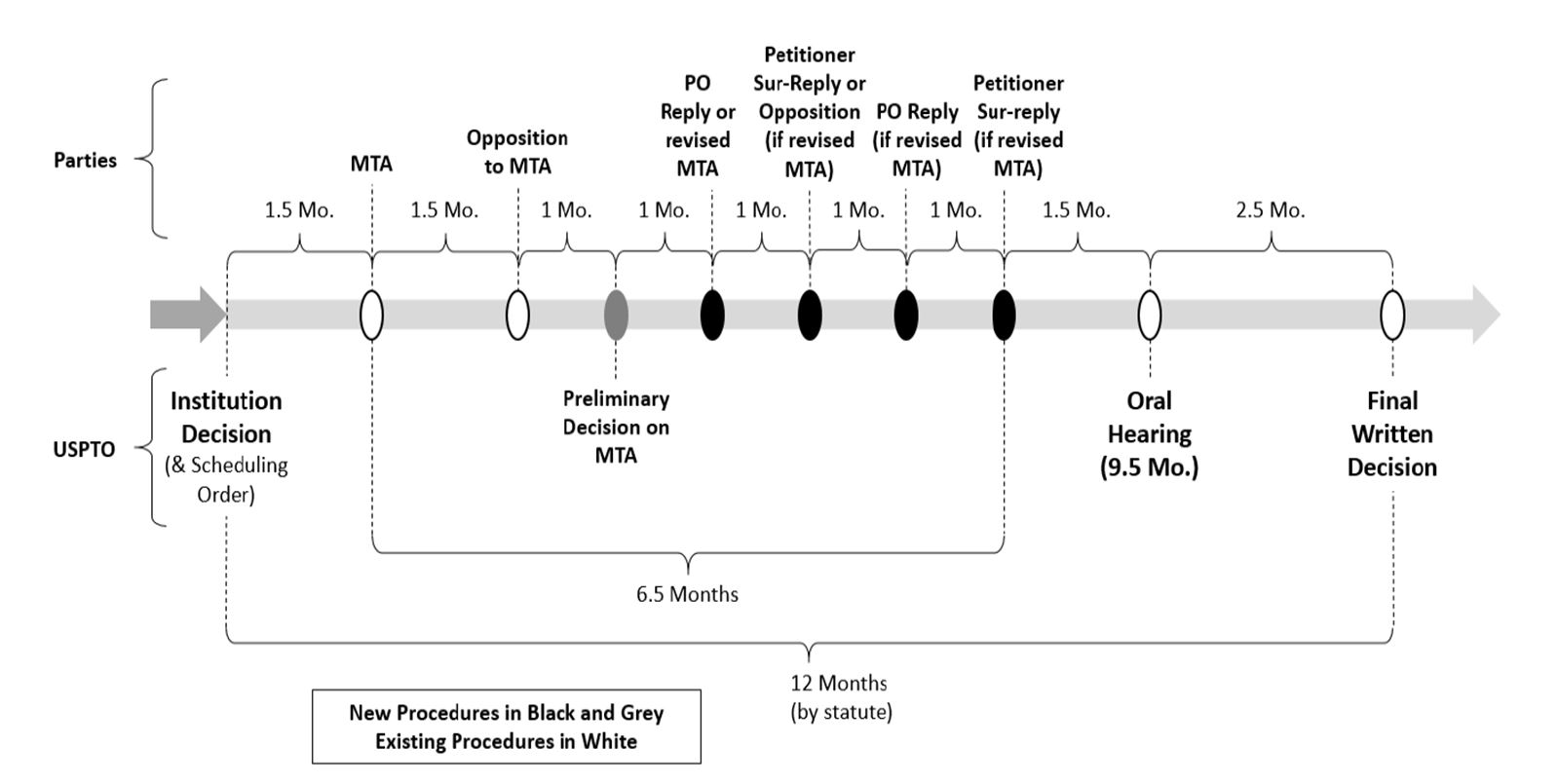On October 26, 2018, the United States Patent and Trademark Office (USPTO) issued a Request for Comment on proposed changes to motion to amend practice in AIA trials. The Office states that its goal in proposing these changes is to “provide an improved amendment practice in AIA trials in a manner that is fair and balanced.” The proposed changes include (1) revamping the process, to include, among other changes, a non-binding preliminary decision on the motion to amend and permitting the patent owner to file a revised motion to amend, and (2) confirming allocation of the burden of persuasion as to the unpatentability of proposed substitute claims to a Petitioner. The USPTO also indicated that it “anticipates” implementing a year-long pilot program of the new procedures “shortly after the comment deadline for the Request for Comments ends on December 14, 2018.” The USPTO included 17 specific questions for parties to consider and requests comments by December 14, 2018. The Request for Comments published in the Federal Register on October 29, 2018 and is available here: https://federalregister.gov/d/2018-23187.
New Procedure
The proposed motion to amend procedures include a preliminary non-binding decision addressing the merits of the motion. After the issuance of the preliminary decision, a patent owner can revise their motion, including changing the initially proposed substitute claims to address issues identified in the preliminary decision.
More specifically, under the proposed procedures, a motion to amend may be filed within 1.5 months of an institution decision and a petitioner’s opposition is due 1.5 months after filing of the motion. The Patent Trial and Appeal Board (PTAB) will issue a preliminary decision on the motion to amend within one month of a petitioner’s opposition. Much like an institution decision, this preliminary decision is not binding. After the preliminary decision, a patent owner has one month to reply and a petitioner is given one month to file a sur-reply. If a patent owner files a revised motion to amend, that revised motion must be filed one month after the preliminary decision in place of the reply. A petitioner has one month to oppose the revised motion followed by patent owner’s reply and petitioner’s sur-reply—each at one month from the previous filing. The USPTO’s timeline is reproduced below.
Source: https://federalregister.gov/d/2018-23187
This proposed procedure appears to require that a patent owner’s motion to amend and petitioner’s opposition to the motion be filed before a patent owner’s response to the institution decision. Similarly, patent owner’s revised motion to amend and petitioner’s opposition to the revised motion are required before a petitioner’s reply to the patent owner response in the underlying PTAB trial. This dual track creates concurrent procedures at the PTAB and places significant demands on both parties prior to oral hearing.
Burden of Persuasion
Currently, the USPTO requires that a petitioner show that proposed substitute claims are unpatentable. This is how the burden is allocated in the informative Western Digital1 decision, which relied upon Aqua Products2, the Board’s Memorandum interpreting Aqua Products3, and Bosch4. Specifically, Western Digital states, “the burden of persuasion will ordinarily lie with the petitioner to show that any proposed substitute claims are unpatentable by a preponderance of the evidence. The Board itself also may justify any finding of unpatentability by reference to evidence of record in the proceeding . . . .”5 The USPTO now seeks to cement that burden of persuasion and requests comments as to whether rulemaking is required to do so.
Pilot Program
The PTO indicated that it anticipates launching a “pilot program” to implement these new procedures, subject to modification, “shortly after the comment deadline for this Request for Comments ends on December 14, 2018.” Under the “pilot program,” the procedures are to be used in every AIA trial with an institution date after implementation of the pilot program. Thus, parties with an institution date after December 14, 2018, should likely expect to be in the pilot program.
1 Western Digital Corp. v. SPEX Techs., Inc. Case IPR2018-00082 (Paper 13) (PTAB April 25, 2018) (Designated Informative on June 1, 2018).
2 Aqua Products, Inc. v. Matal, 872 F.3d 1290 (Fed. Cir. 2017).
3 See Memorandum “Guidance on Motions to Amend in view of Aqua Products” (Nov. 21, 2017 (https://www.uspto.gov/sites/default/files/documents/guidance_on_motions_to_amend_11_2017.pdf).
4 Bosch Auto. Serv. Sols., LLC v. Iancu, Order on Petition for Panel Rehearing, No. 2015-1928 (Fed. Cir. Mar. 15, 2018).
5 Western Digital v. SPEX Techs., Inc., IPR2018-00082 (Paper 13) at 4.

Receive insights from the most respected practitioners of IP law, straight to your inbox.
Subscribe for Updates
